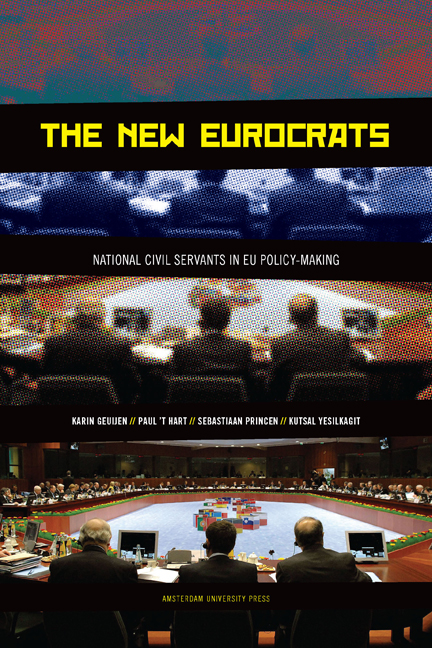Book contents
- Forntmatter
- Contents
- Tables and Figures
- Acknowledgements
- Chapter One Studying Eurocrats At Work
- Chapter Two Toward a Europeanised Civil Service? a Survey Study
- Chapter Three Eurocratic Work As Strategic Behaviour: Moving Before the Commission Does in Veterinary Policy
- Chapter Four Getting Things Done in European Police Co-Operation
- Chapter Five Bridge Builders Or Bridgeheads in Brussels? the World of Seconded National Experts
- Chapter Six Understanding Eurocratic Work: Conclusions and Reflections
- Appendix: Items on Europeansation Included in the ‘Pomo’ Survey
- Notes
- Bibliography
- About the authors
- Index
Chapter Four - Getting Things Done in European Police Co-Operation
Published online by Cambridge University Press: 15 January 2021
- Forntmatter
- Contents
- Tables and Figures
- Acknowledgements
- Chapter One Studying Eurocrats At Work
- Chapter Two Toward a Europeanised Civil Service? a Survey Study
- Chapter Three Eurocratic Work As Strategic Behaviour: Moving Before the Commission Does in Veterinary Policy
- Chapter Four Getting Things Done in European Police Co-Operation
- Chapter Five Bridge Builders Or Bridgeheads in Brussels? the World of Seconded National Experts
- Chapter Six Understanding Eurocratic Work: Conclusions and Reflections
- Appendix: Items on Europeansation Included in the ‘Pomo’ Survey
- Notes
- Bibliography
- About the authors
- Index
Summary
‘I am here to represent the Netherlands, and my colleagues back home sometimes find it difficult to appreciate that. They do the bidding of the individual ministries. Their arena is about pulling and hauling between ministries. Here the arena is about pulling and hauling between countries’ (Official of the Dutch Permanent Representation in the EU).
Q: Are you a Dutchman, a European, or a Euregional citizen?
‘I am first and foremost a Euregional policeman. As far as my organisational back office is concerned, I am embedded in the Dutch system, but the actual job lies in this transnational region, and this is on the increase. So I have to play chess simultaneously on two boards: the Dutch and the Euregional. That implies an additional work load.’
Q: Do you behave differently because of this?
‘There is no hierarchy in the co-operation with the other countries. It is more a social, network-like thing. Co-operation is all you’ve got. It is much less direct than working in a national command hierarchy. You actually have to place yourself in the other person's shoes’ (A senior police official in the Dutch province of Limburg).
Eurocratic work in the Third Pillar: A different world?
In this chapter, as in the previous one, we will look at European governance through the eyes of people who routinely ‘do it’ as part of their jobs as national civil servants. We want to know how these national Eurocrats operate in international arenas and how this EU-related work is embedded in and facilitated by the organisations they are part of. In chapter 3, we focused on the veterinary policy case, in which the Commission was a crucial actor, driving a highly institutionalised regime of technocratic deliberation and negotiation, which is punctuated only occasionally by politically explosive issues such as BSE and avian influenza. We demonstrated that, in this context, Eurocratic work evolves around a number of key tactics (signalling, frontloading and coalition formation) that allow the main actors to gain and maintain control of the course and outcomes of key dossiers.
In the current chapter, we switch our focus to study Dutch Eurocrats in the field of European police co-operation.
- Type
- Chapter
- Information
- The New EurocratsNational Civil Servants in EU Policy-making, pp. 77 - 102Publisher: Amsterdam University PressPrint publication year: 2008

